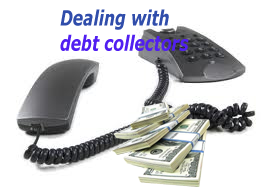 If you’ve ever fallen far behind on paying your bills, you know what it’s like to dread whenever the phone rings: What if it’s another bill collector? Ignoring the call – like ignoring a toothache – is never a good idea. Sooner or later, you’re going to have to deal with the situation.
If you’ve ever fallen far behind on paying your bills, you know what it’s like to dread whenever the phone rings: What if it’s another bill collector? Ignoring the call – like ignoring a toothache – is never a good idea. Sooner or later, you’re going to have to deal with the situation.
According to Gail Cunningham, spokesperson for the National Foundation for Credit Counseling (NFCC), “Our 2011 Financial Literacy Survey found that most people – 68 percent – pay their bills on time. However, 28 percent said they experience difficulty making timely bill payments.”
Ideally, you should contact your lender as soon as you realize you may have difficulty paying a bill. They would much rather work out a repayment plan than enter the costly and time-consuming collections process. But, if that ship has already sailed, here are a few precautions you can take to protect your interests:
You have certain rights whenever dealing with debt collectors. For example, collectors cannot harass you by:
- Using abusive language or threatening violence or arrest.
- Calling before 8:00 a.m. or after 9:00 p.m.
- Falsely representing themselves as attorneys or government employees if they are not.
- Threatening to sue you if they don’t intend to.
- Contacting you at work if you tell them your employer disapproves.
- Contacting others, except to verify where you live and work.
- Revealing to others that you owe money.
If a collection agency contacts you initially by phone, they must send written notice within five days stating how much you owe, the name of the creditor owed and how to file a dispute if you don’t agree. Once contacted, you should:
- Get names of all persons calling and their agency, its address, phone and fax numbers.
- Take detailed notes of all conversations, correspondence and pre-recorded calls, noting names, dates and times.
- You may request that all subsequent contact be handled by mail. Send this request – and all further correspondence – by certified mail, return receipt requested.
- Request that all conversations be followed-up in writing.
- Document any false, misleading or harassing statements and include them in your correspondence.
- Request full details about any debts the collector claims you owe, including dates, amounts, lender’s name, etc.
- Instruct that you be the only person contacted, unless you want your attorney involved.
- Retain all records indefinitely in case of future disputes.
- Have all agreed-to repayment plan terms verified in writing, including promises to remove or adjust reports to your credit history.
If you feel you’ve been targeted in error, tell the collection agency – in writing – that it has the wrong party and to stop contacting you. If they can’t provide proof, by law they must cease collection efforts.
Unfortunately, it’s not uncommon for identity thieves to run up debt in someone else’s name and to have those unpaid debts eventually go into collection. That’s why it’s important to check your credit reports regularly and to report any errors or mistaken transactions immediately. You can order one free credit report a year from each of the three main credit bureaus through www.annualcreditreport.com.
The Privacy Rights Clearinghouse’s “Debt Collection Practices: When Hardball Tactics Go Too Far,” offers great tips on navigating the debt-collection process, including your privacy rights, sample letters and where to turn for help (www.privacyrights.org/fs/fs27-debtcoll.htm).
Jason Alderman directs Visa’s financial education programs. To Follow Jason Alderman on Twitter: www.twitter.com/PracticalMoney.

